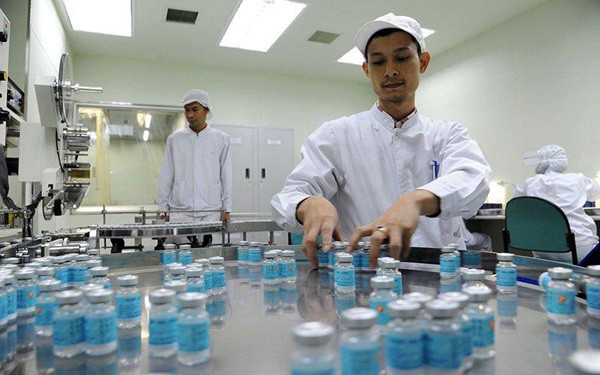
The Quan doi Nhan dan (People’s Army) newspaper quoted Ong The Due, deputy head of the Faculty of Health Financing and Health Technology Assessment of the Health Strategy and Policy Institute under the Ministry of Health, as saying that the capacity to develop and manufacture vaccines will help countries avoid risks caused by a shortage of vaccines for domestic demand when depending on the supply of vaccines from outside.
Countries that can produce vaccines will also be more proactive with strategies for disease prevention and control, ensuring a timely response to epidemic situations, emerging diseases, or the emergence of new virus variants in the future as well as improving the health of the people and the community, he said.
Nguyen Khanh Phuong, Deputy Director of the Health Strategy and Policy Institute, said that Vietnam has many advantages in producing vaccines, noting that the country has four state-owned enterprises and some private establishments that meet good manufacturing practice (GMP) standards. Vietnam has also mastered many vaccine technologies such as those for inactivated vaccines, antitoxin vaccines, and subunit vaccines.
However, according to Phuong, the current limitation in Vietnam's vaccine production is that most domestically produced vaccines are monovalent vaccines due to limited technical level and resources. State investment in vaccine research and production is still low, and there is a lack of sustainable financial resources to maintain a high rate of expanded vaccination, she added.
Realising the need to strengthen domestic vaccine production and certification capacity based on the successful application of mRNA technology during the pandemic, Vietnam has participated in the mRNA Technology Transfer Programme initiated by the World Health Organisation (WHO).
According to Patrick Haverman, United Nations Development Programme Deputy Resident Representative in Vietnam, this is a great opportunity for Vietnam to access mRNA technology for vaccine production.
However, he underlined the need for Vietnam to carefully consider the steps, scale and sources of the required investment as well as expertise development to ensure the effectiveness and financial sustainability of this technology transfer.
The collaboration among the key ministries, sectors, departments, institutes, enterprises, senior experts, and partners will contribute to developing an effective national strategy to improve vaccine access in Vietnam in the coming time, Haverman said.
Phuong also laid stress on the development of highly qualified and skilled human resources for vaccine production and the building of GMP production facilities to meet domestic and export demand./. VNA